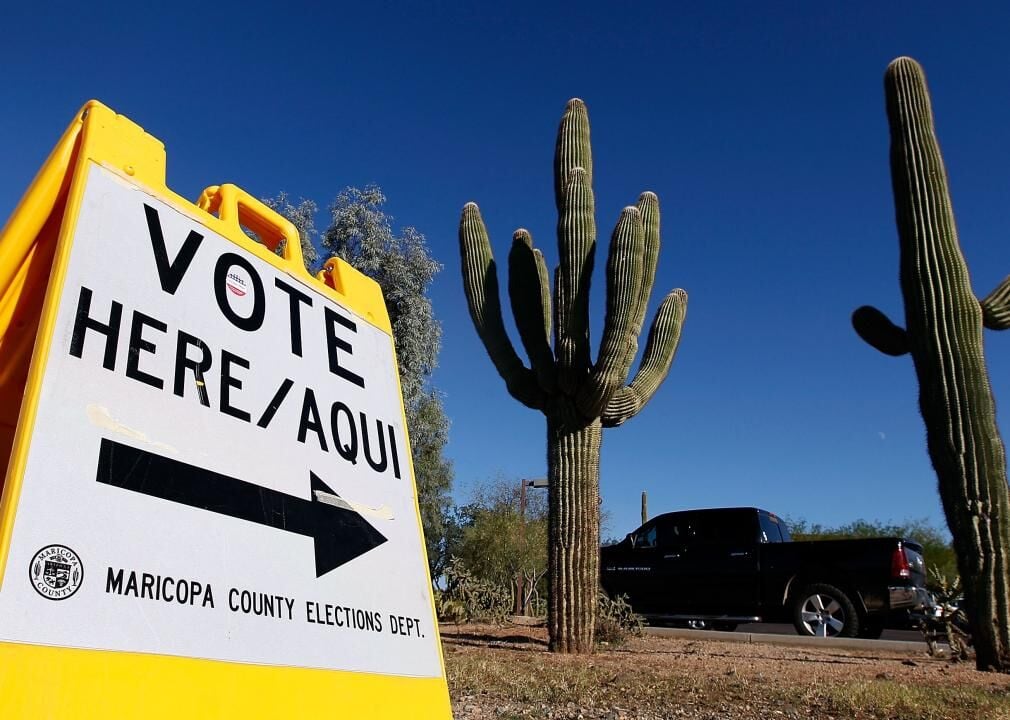PHOENIX — A federal judge has blocked the state from enforcing a new law that he said could inadvertently make felons out of volunteers who register people to vote.
Judge Murray Snow said a provision in SB 1260, approved earlier this year by the Republican-controlled Legislature, is so poorly written that anyone reading it would not know what is — and is not — legal. That makes it unconstitutionally too vague to be on the books, he said.
Snow also said he won’t let the state implement another part of the same law detailing when county election officials are required to cancel a voter’s registration. The judge said it runs afoul of the National Voter Registration Act, which requires that the person be notified before being taken off voter rolls.
The judge’s order is not the last word.
It still gives Republican Attorney General Mark Brnovich the chance to argue the two provisions are in fact legal.
But it means no one will be arrested for violating the new law and no registrations will be canceled under its terms until there is a final ruling — if then, as the judge said he already believes the challenge ultimately is likely to succeed.
The law is being challenged by Arizona Alliance for Retired Americans, Voto Latino, and Priorities U.S.A., groups that sign people up to vote.
SB 1260, sponsored by Sen. J.D. Mesnard, R-Chandler, was one of dozens of measures proposed by GOP lawmakers this year amid claims changes were needed to prevent fraud.
It includes language making it a Class 5 felony if anyone “knowingly provides a mechanism for voting to another person who is registered in another state.’’ That carries a presumptive 18-month prison term.
Mesnard said the target is anyone who would forward an early ballot addressed to someone not living in Arizona.
He acknowledged he has no first-hand knowledge of people getting early ballots from Arizona who are registered elsewhere. Instead, he said, “I’ve had folks come to me and insist this has happened.
“I’ve not gone to investigate,’’ he continued. But Mesnard said his legislation would will “make it clear’’ what the law requires.
Only thing is, Snow wrote, the bill does not define what is a”mechanism.’’
“Thus, in the context of SB 1260, the ordinary meaning of “’mechanism for voting’ could include any necessary items involved in the process of voting,’’ the judge said.
That is where it creates legal problems for the groups challenging the new law, he said.
For example, Snow said, a voter registration form is a “mechanism for voting,’’ as registration is a prerequisite to being able to cast a ballot.
“It is entirely possible that plaintiffs, in registering newly arrived residents, may be charged with knowledge that those new residents didn’t cancel their previous voter registrations,’’ Snow wrote. “Plaintiffs would thus have committed the new felony if registering a voter is a mechanism for voting.’’
If nothing else, the judge said, the lack of clarity in the law will chill voter registration efforts as individuals can’t know how law enforcement officers, prosecutors or state judges might seek to define the phrase that lawmakers did not.
Brnovich, in a bid to keep Snow from blocking the law, avowed to the judge that the challengers were in no danger of being prosecuted for voter-registration activities.
Snow was not impressed.
“As the attorney general acknowledges, his interpretation will not bind his successor in office,’’ the judge said, pointing out that Brnovich will be out of office at the end of the year.
The other provision Snow blocked deals with those already registered to vote in Arizona.
It says if a county recorder receives “credible information’’ that someone is registered in another county and confirms that fact, the recorder must cancel that person’s registration.
Attorney for the plaintiffs Daniel Arellano argued that creates a situation where someone who has moved loses his or her registration in both the old and new counties. Worse, he said, the person wouldn’t even know.
Snow said the legal issue is basic.
He said the National Voter Registration Act spells out the ways a state can cancel someone’s registration.
One is if the person directly requests to be removed from the rolls.
States also can cancel a registration if the person has confirmed in writing he or she has moved out of the registration area. And cancellation is allowed only after providing notice followed by a specified waiting period.
SB 1260, he said, complies with none of those provisions.
There was no immediate response from Brnovich.





